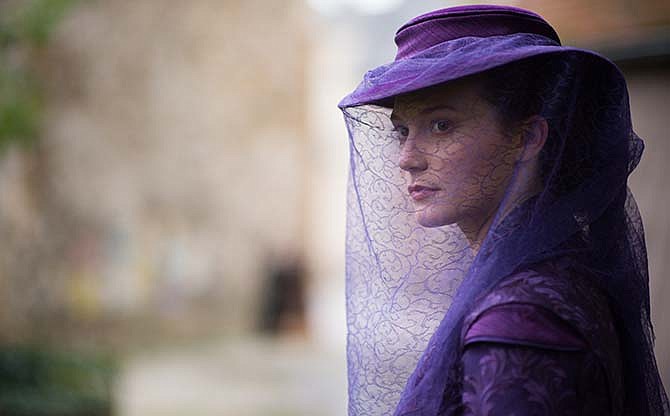What is it about Emma Bovary?
She is, of course, one of literature's most famous and tragic heroines, and so it's no surprise that directors from Jean Renoir (1934) to Vincente Minnelli (1949) to Claude Chabrol (1991) have tried to immortalize Gustave Flaubert's frustrated, yearning 19th-century housewife on film. But the task has proven exceedingly difficult.
Now, tantalizingly, we have a female director - Sophie Barthes - attempting to capture Emma's devastating story. Sad to say, Barthes' version doesn't break much ground. In fact, though it's often beautiful and stars the usually compelling Mia Wasikowska, the film is maddeningly flat, and at times simply tiresome.
The curiosities of this version start at the very beginning. We see Emma running through the woods in a lovely embroidered dress, clutching at her stomach, clearly suffering. Soon she's lying on the ground, turning deadly pale.
Barthes is, essentially, giving us the end before the start. It would have been more effective to get there gradually. We now need to put this image behind us, and focus on how Emma got to her moment of crisis. But the drama of the next 117 minutes never lives up to that of the first.
After the opening, we go back to Emma's school years in a rural Normandy convent. Her education is ending, though; Emma is to be married to a country doctor chosen by her father. Barthes does a lovely job portraying a simple French country wedding, with a church ceremony and family meal in the garden.
Soon Emma's off in a horse-drawn carriage to her new life. Charles Bovary (Henry Lloyd-Hughes) is a very decent but dull man, with few ambitions other than to serve the local townspeople. Emma dreams of something more.
One of this film's main problems surfaces early: a strange disconnect in the way the actors sound. They speak in English, but in their own accents - French accents, British accents, American accents. Wasikowska, though she's Australian, sounds like she's in the modern-day U.S here, and her very contemporary manner of speaking becomes increasingly jarring in this period piece.
When the disillusioned Emma meets Leon, a young, handsome law clerk (Ezra Miller), we know there's going to be trouble. She rejects his amorous advances, reminding him she's married, but when she hears he's moving to nearby Rouen to pursue his studies, she falls apart. "I imagined that this would be the happiest time in my life," she weeps to her household maid. "Is my future just a dark corridor with a bolted door at the end?"
Emma's road to ruin - adultery - comes first with the handsome, rakish Marquis (Logan Marshall-Green), who invites the couple to a hunt at his estate. To clothe herself properly, Emma seeks out local merchant Monsieur Lheureux (Rhys Ifans, amusingly villainous and injecting life into the proceedings), who agrees to make her a lovely riding dress on credit - the start of a dangerous relationship.
Soon, other dangerous relationships form. Emma succumbs to the physical charms of the Marquis. While cheating on Charles, she's also filling their home with beautiful carpets and silks from Monsieur Lheureux - none of which her oblivious husband can afford. Then, her lover bails on her - commitment issues, of course, plus he's French.
Once recovered from that trauma, Emma reconnects with young Leon, but that affair, too, will end in tatters. And then Lheureux comes calling for his money.
Readers know what happens. Alas, along the way to the screen, much of the famous detail in Flaubert's novel has gotten lost somewhere in those beautiful, misty woods that Emma frequently escapes to, and where our story ends. This movie may find you wanting to pick up the book to fill those gaps.
Which isn't a bad thing at all, of course.
"Madame Bovary," an Alchemy release, is rated R by the Motion Picture Association of America "for some sexuality/nudity." Running time: 118 minutes. Two stars out of four.
Video:

